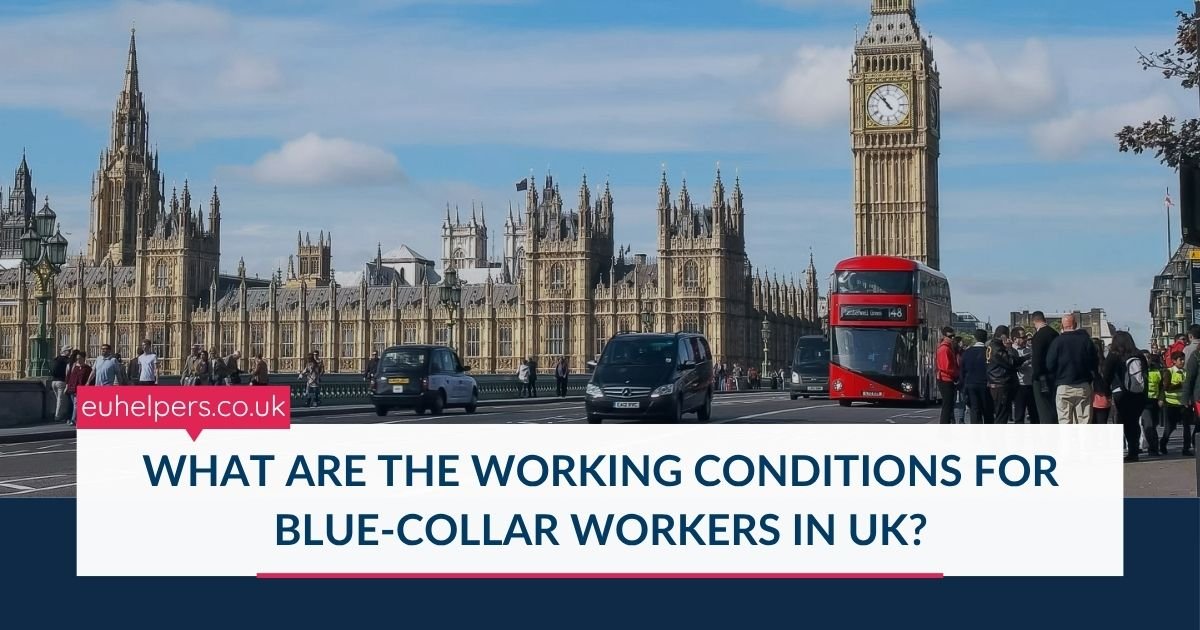
The United Kingdom has a strong blue-collar workforce that supports industries such as construction, manufacturing, logistics, maintenance, and cleaning services. Blue-collar workers — both local and foreign — benefit from strict labor laws, minimum wage protection, and safe workplace standards.
The UK ensures that all employees, regardless of nationality, receive fair treatment, proper working hours, and access to social benefits under the Employment Rights Act 1996 and Health and Safety at Work Act 1974.
Work Environment
Blue-collar jobs in the UK are known for being structured, well-regulated, and safety-focused. Depending on the industry, workers may be employed in factories, warehouses, construction sites, or service facilities.
Employers must:
-
Provide protective equipment (PPE) such as helmets, gloves, and safety shoes
-
Conduct regular health and safety training
-
Ensure clean, well-ventilated workspaces
-
Maintain compliance with fire, hygiene, and emergency standards
The UK’s Health and Safety Executive (HSE) routinely inspects worksites to ensure compliance with national standards.
Working Hours and Shifts
Blue-collar employees in the UK usually work:
-
35–48 hours per week (depending on contract type)
-
5–6 days a week, with paid rest breaks
-
Shift-based schedules for factory, warehouse, and cleaning roles
The Working Time Regulations 1998 limit the average workweek to 48 hours unless a worker opts out voluntarily. Employees are entitled to:
-
11 consecutive hours of rest per day
-
At least one day off per week
-
20 minutes break for every 6 hours worked
Overtime pay or time-off compensation is common for extended shifts.
Wages and Benefits
The UK enforces a National Minimum Wage (NMW) and National Living Wage (NLW), ensuring fair pay for all legal workers.
| Age Group / Category | Hourly Wage (as of April 2025) | Monthly Average (Full-time) |
|---|---|---|
| Workers aged 21 and over | £11.44 | £1,900 – £2,200 |
| Apprentices | £6.40 | £1,000 – £1,200 |
| Experienced blue-collar workers | £12–£15+ | £2,100 – £2,600 |
Most blue-collar employees receive additional benefits such as:
-
Paid annual leave (28 days per year including public holidays)
-
Sick pay (Statutory Sick Pay – SSP)
-
Pension contributions (auto-enrolment by employers)
-
Overtime or night shift allowance
-
Accident and health insurance coverage
Accommodation and Facilities
Some UK employers — particularly in manufacturing, construction, and hospitality — provide or arrange shared housing for foreign workers. Accommodation may include:
-
Furnished rooms with heating and Wi-Fi
-
Shared kitchens and laundry facilities
-
Proximity to the workplace or public transport
While accommodation standards vary, employers must comply with UK housing and safety regulations to ensure decent living conditions.
Health and Safety Standards
The UK’s Health and Safety Executive (HSE) enforces strict workplace safety rules. Every employer is legally responsible for:
-
Conducting risk assessments
-
Providing first-aid equipment
-
Reporting accidents or injuries (RIDDOR compliance)
-
Offering training in safe machinery use
Foreign workers also have the right to refuse unsafe work and report hazards anonymously to the HSE.
Work-Life Balance
Blue-collar workers in the UK enjoy regulated hours, paid holidays, and protection from exploitation. The UK emphasizes equality in employment — ensuring foreign workers have the same rights as UK citizens under the Equality Act 2010.
Many companies encourage work-life balance through:
-
Flexible shifts or part-time roles
-
Paid family or parental leave
-
Union representation for workers’ welfare
Why Work as a Blue-Collar Employee in the UK
-
Transparent and lawful employment system
-
Reliable wages and legal job protections
-
Opportunity for visa extensions or long-term stay
-
Safe, multicultural work environment
-
High demand for skilled trades and service roles
Common industries hiring blue-collar workers include:
-
Construction and renovation
-
Warehousing and logistics
-
Cleaning and facility management
-
Food processing and packaging
-
Maintenance and manufacturing
Key Tips for Foreign Workers
-
Verify your UK work visa and employer’s sponsorship status
-
Sign a written employment contract before arrival
-
Register for a National Insurance (NI) number
-
Keep digital copies of your pay slips and employment documents
-
Learn basic English for workplace communication and safety instructions
